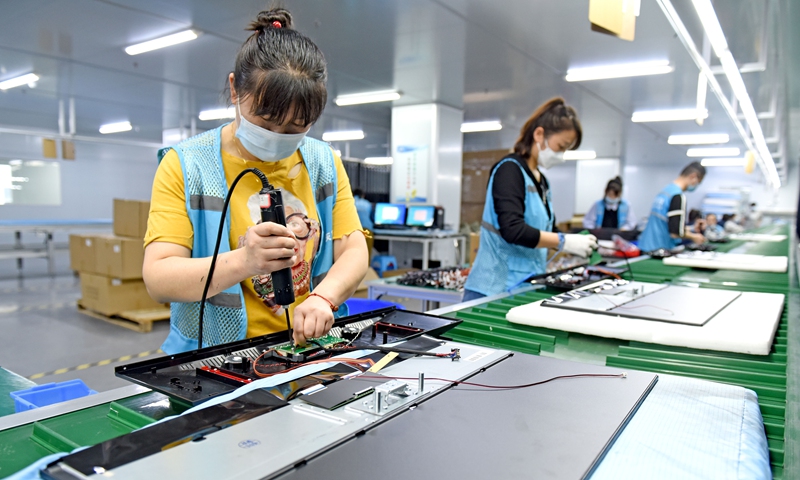
File photo shows a view of the Lujiazui area in Shanghai.Photo:Xinhua
China's State Council, the cabinet, on Wednesday held what has been seen as an unprecedented national video teleconference on stabilizing the economy with reportedly upwards of 100,000 participants, including officials of various levels, stressing the need to better implement measures to safeguard market entities, employment, people's livelihood and keep the economy operating in a reasonable range.
Coming as activity in the world's second-largest economy seems grimmer than expected, the gathering, on the heels of several momentum pro-growth-themed meetings, indicates an imperative to bring the economy back on track, experts said, expecting local governments to play a more decisive and effective part in implementing stabilization policies.
The scale and format of the meeting also underscored China's unique institutional strength in mobilizing nationwide efforts to tackle major issues, experts noted.
Addressing the conference, Premier Li Keqiang said that since March, and more especially in April, some economic indicators, including employment, industrial production, power generation and cargo freight, apparently trended lower, with hardships coming across as to some extent greater than those seen during the initial virus outbreak in 2020.

Workers manufacture display panels on an assembly line in Huainan High-Tech Industrial Development Zone in East China's Anhui Province, on April 24, 2022. Photo: VCG
Li further noted that development is the basis of and key to resolving all of the country's problems, while calling for an effective coordination of virus containment and economic and social development. Stabilizing growth needs to be given a higher priority as the country focuses on ensuring market entities, employment and people's livelihoods, the premier stated.
Li stressed protecting the economy's resilience and striving to ensure reasonable growth for the second quarter and a decline in the unemployment rate as soon as possible, so as to keep economic operations within a reasonable range.
The meeting was presided over by Vice Premier Han Zheng. Also attending the meeting were Sun Chunlan, Hu Chunhua and Liu He, the other three vice premiers. Notices of the teleconference scheduled for 3pm on Wednesday were circulated across local governments at the provincial, city and county levels, Chinese news site eeo.com.cn reported on Wednesday, estimating that the number of participants in the virtual gathering would top 100,000.
Put in perspective, a previous sizable meeting was held on February 23, 2020 with 170,000 officials nationwide by video link, which focused on coordinating epidemic controls with economic and social development.
Swiftly after the conclusion of the meeting on Wednesday, some provinces had already moved to align their local economic work with the unprecedented push for implementation.
Wang Hao, governor of East China's Zhejiang Province, vowed to press ahead with the province's implementation plans for the 33-item stabilization policy, ramp up the local economy's return to the normal track and make the province's due contribution to stabilizing the economy at large.
The meeting followed a State Council executive meeting on Monday, which took the wraps off 33 pro-growth measures, as well as a symposium on stabilizing growth and ensuring employment held in Southwest China's Yunnan Province that was presided over by the premier last week.
"The much more widely attended meeting this afternoon was to make sure that the guidance and specific work plans of the central government reach the community level directly and quickly, so that governments at all levels will introduce more effective policies to stabilize growth, ensure market entities, ensure employment, and ensure people's well-being," Hu Qimu, chief research fellow at the Sinosteel Economic Research Institute, told the Global Times on Wednesday.
Economic activity for the most part of May was not as vibrant as expected, suggesting that the downtrend in April has yet to be arrested, Tian Yun, a Beijing-based economist, told the Global Times on Wednesday.
The central government has introduced measures to stabilize the economy, but that economic activity — as measured by power generation, cargo movements, exports and consumption — hasn't expanded in proportion to the pro-growth policies is mostly attributed to issues regarding implementation of the measures at various local levels, Tian stressed.
The economist described the meeting as troubleshooting the poorer-than-expected economic operation.
At the keenly watched gathering, the premier urged policies crystallized by the Central Economic Work Conference in December and the annual government work report this March to be basically implemented in the first half. In addition, a slew of stabilization policies unveiled at the State Council executive meeting ought to be complemented by rules for implementation by the end of May.
The premier urged efforts to ensure COVID-19 prevention and control while fulfilling economic and social development tasks.
The State Council will dispatch a task force to 12 provinces on Thursday to oversee local governments' policy implementation and supplemental measure rollout, the premier disclosed, adding that major economic indicators for the second quarter across different parts of the country would be published by national statistics departments in a law-abiding and truth-based manner.
It is expected that local governments will introduce intensive policies to support the resumption of work and production, as well as policies to protect employment, and more precise policies to effectively coordinate epidemic prevention and control with economic and social development, according to Hu.
News about the Wednesday meeting quickly went viral on Chinese social media shortly ahead of its start. Buoyed by the news, both Chinese mainland shares and Hong Kong stocks ended higher on Wednesday, reversing the previous day's losses.





